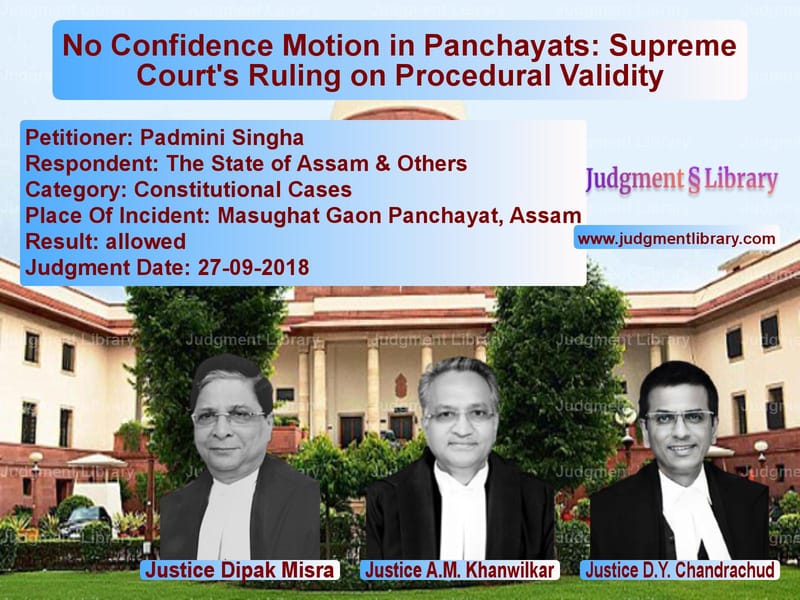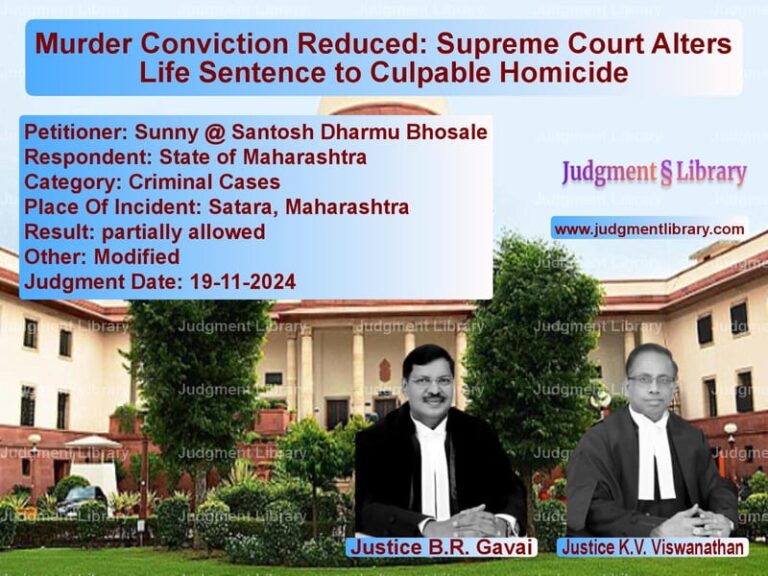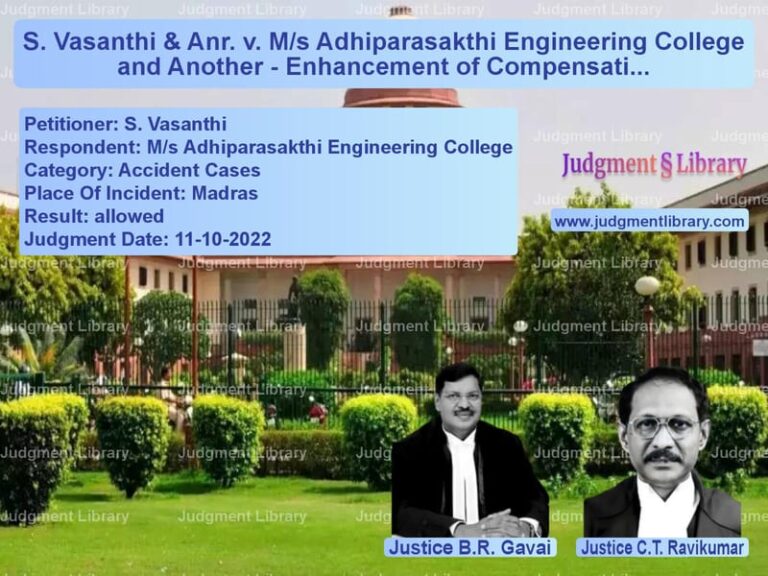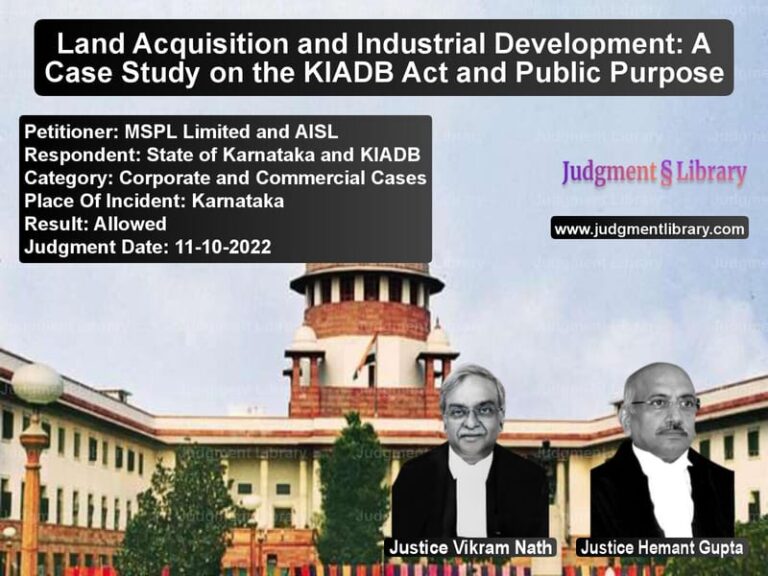No Confidence Motion in Panchayats: Supreme Court’s Ruling on Procedural Validity
The case of Padmini Singha vs. The State of Assam & Others is a landmark ruling regarding the procedural validity of a no-confidence motion against a Panchayat President. The Supreme Court examined whether a meeting to discuss the motion, convened by a Block Development Officer (BDO) instead of the Deputy Commissioner, was legally valid.
Background of the Case
The appellant, along with seven members of the Masughat Gaon Panchayat, submitted a no-confidence motion against the President (Respondent No.6) on 30.01.2014. As per Section 15(1) of the Assam Panchayat Act, 1994, a special meeting should have been convened to decide the motion. However, due to delays and procedural hurdles, the matter was referred to the Block Development Officer (BDO), who convened the meeting and presided over it.
The no-confidence motion was passed with nine votes in favor and one against. Following this, the appellant, as Vice President, was directed to function as in-charge President.
Legal Issues Before the Court
- Was the no-confidence motion valid when the meeting was convened by the BDO instead of the Deputy Commissioner?
- Did the High Court err in setting aside the resolution based on procedural lapses?
- Should procedural irregularities nullify the democratic decision of the Panchayat members?
Petitioner’s Arguments
The appellant argued that:
- The resolution was passed in compliance with the Assam Panchayat Act, and procedural errors should not override the democratic will of the Panchayat members.
- The respondent participated in the meeting and signed the resolution, indicating her acknowledgment of the process.
- The resolution reflected the majority view of the Panchayat members and should not be invalidated on technical grounds.
Respondents’ Arguments
The respondent and the State of Assam argued that:
- The Assam Panchayat Act, 1994, specifically mandates that the Deputy Commissioner convene such meetings. The BDO lacked legal authority to do so.
- The High Court correctly ruled that procedural compliance is essential, and deviations cannot be ignored.
- The resolution was legally invalid because it was passed in a meeting that did not follow the prescribed process.
Supreme Court’s Observations
The Supreme Court, comprising Dipak Misra, A.M. Khanwilkar, and D.Y. Chandrachud, made the following key observations:
1. Principle of Procedural Compliance: “When a law mandates a procedure, the same must be followed. However, the consequences of non-compliance must be assessed based on whether it affects the fairness of the process.”
2. Waiver of Procedural Defects: “If a statutory requirement is in place for the benefit of an individual, that individual can waive the condition. In this case, the respondent attended the meeting and signed the resolution, thus waiving her right to challenge the procedural defect.”
3. Validity of the No Confidence Motion: “Democratic processes should not be nullified based on minor procedural lapses when the intent of the majority is clear and unchallenged.”
Final Judgment and Directions
The Supreme Court ruled in favor of the appellant and held that:
- The no-confidence motion was valid despite the procedural lapses.
- The High Court’s ruling was overturned, and the resolution passed by the Panchayat members was restored.
- The competent authority was directed to implement the resolution immediately.
Impact of the Judgment
This ruling has significant implications for local governance and procedural compliance:
- It establishes that procedural lapses do not automatically invalidate democratic decisions.
- It reinforces the principle that participation in a meeting can amount to waiver of procedural objections.
- It upholds the legitimacy of democratic decisions taken at the Panchayat level.
Conclusion
The Supreme Court’s decision in this case upholds the principles of democracy and procedural fairness. The ruling ensures that elected representatives cannot use technicalities to evade no-confidence motions and that procedural compliance must be balanced against the larger goal of democratic governance.
Petitioner Name: Padmini Singha.Respondent Name: The State of Assam & Others.Judgment By: Justice Dipak Misra, Justice A.M. Khanwilkar, Justice D.Y. Chandrachud.Place Of Incident: Masughat Gaon Panchayat, Assam.Judgment Date: 27-09-2018.
Don’t miss out on the full details! Download the complete judgment in PDF format below and gain valuable insights instantly!
Download Judgment: Padmini Singha vs The State of Assam & Supreme Court of India Judgment Dated 27-09-2018.pdf
Direct Downlaod Judgment: Direct downlaod this Judgment
See all petitions in Fundamental Rights
See all petitions in Legislative Powers
See all petitions in Public Interest Litigation
See all petitions in Judgment by Dipak Misra
See all petitions in Judgment by A M Khanwilkar
See all petitions in Judgment by Dhananjaya Y Chandrachud
See all petitions in allowed
See all petitions in supreme court of India judgments September 2018
See all petitions in 2018 judgments
See all posts in Constitutional Cases Category
See all allowed petitions in Constitutional Cases Category
See all Dismissed petitions in Constitutional Cases Category
See all partially allowed petitions in Constitutional Cases Category







